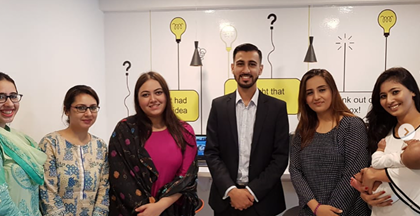60 seconds with Asad Ansari

Asad Aamir Ansari works in Financial services, managing a financial consultancy and training business. Asad believes in actively supporting a diversity and learning agenda for young professionals. He’s also on the Armed Forces Muslim Forum communication group committee and, among other volunteering roles, he is an ambassador for the Council of British Hajjis UK.
What is a typical working day like for you?
No two days are the same here. A new day brings a new challenge, and I’m always striving to go further. I usually start the mornings by reflecting on the previous days’ tasks and noting down those for the current day, before jumping into some back-to-back meetings until lunch time. After that I work through tasks until the end of the day. (It can be quite late at times, but it’s all part of the fun!)
What has been the biggest highlight of your career to date? And some of the challenges?
A big highlight for me was the sense of achievement I had from working on client engagement across the UK with about 1,800 staff working both day and night shifts. I’d just landed a contract with the Big4 when I took on this project and the mountain of work forced me to find my feet straight away. It gave me motivation; I could see the opportunity to move up in the ranks! The key challenge was getting to the heart of how a corporate environment works. This pushed me to get to know the right people, so I could bring value their way.
Philanthropy and giving back is a big part of your life – what approach to philanthropy have you adopted and how much has this been influenced by your professional life?
Philanthropy is a huge part of my life. It fills a gap for me. The more I help others, the more it pays off personally. In a small way, I’m trying to help make a lasting impact in others’ lives. All the initiatives I’m working on with trustable charities in different sectors, help me do that.
You recently visited one of the British Asian Trust’s mental health partners in Pakistan, Sehat Kahani. Can you tell us a little about your visit and what you observed?
The importance of increasing mental health awareness resonates because I experienced mental health difficulties myself, from a young age. I was fortunate because I was able to get the right help at the right time. There’s a serious lack of awareness and access in Pakistan. I recently visited Sehat Kahani, who are working on a mental health programme that aims to benefit the whole country and have lasting impact.
Sehat Kahani seeks to democratise healthcare. Its aim is to build an all-female health-provision network to deliver quality healthcare using tele-health. A key area of the British Asian Trust’s work in South Asia is around Mental Health. Our partnership with Sehat Kahani is focused on revolutionising mental health awareness and access in Pakistan.
August 2018
